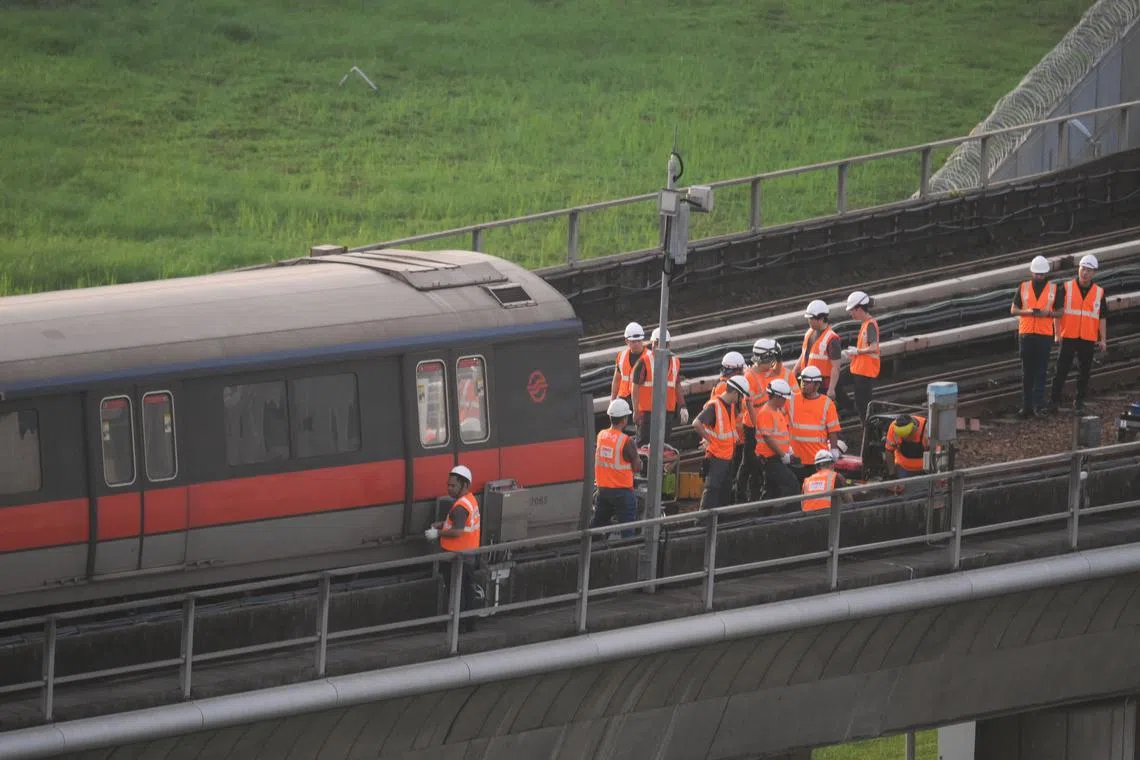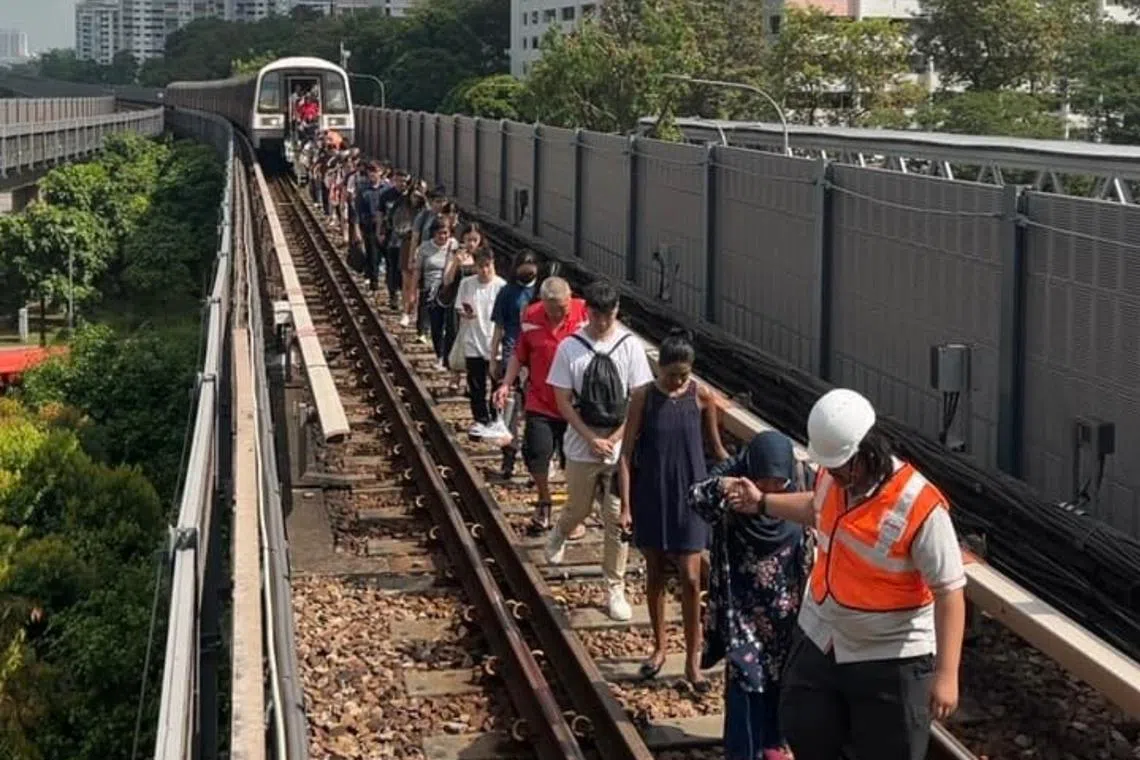First-generation trains have service life of 38 years, will be replaced by end-2026: Chee Hong Tat
Sign up now: Get ST's newsletters delivered to your inbox

Work being done on the affected train outside Ulu Pandan Depot on Sept 25.
PHOTO: ST FILE
Follow topic:
SINGAPORE – The faulty train that triggered a massive six-day disruption on the East-West Line (EWL)
That being said, Mr Chee also pointed out that train reliability depends on several factors, not just age. Trains that remain reliable can continue to be used if they have not exceeded their service life, he added.
Responding to questions from Workers’ Party (WP) MPs Gerald Giam (Aljunied GRC) and Dennis Tan (Hougang), Mr Chee said the “structural integrity of the (first-generation Kawasaki Heavy Industries (KHI)) trains was assessed by an independent assessor in 2012, who concluded that the trains have a total service life of 38 years”.
The MPs had asked about the maintenance regime of the KHI trains still in service. Forty-eight of such trains – excluding the faulty one – are still in service, plying the North-South Line and EWL. The trains are at least 35 years old.
Mr Chee said in a ministerial statement that these trains are being phased out, with the Land Transport Authority (LTA) planning to “replace all KHI trains with new trains by end-2026, before they reach their 38-year service mark”.
Mr Saktiandi Supaat (Bishan-Toa Payoh GRC) asked Mr Chee about striking “the right balance between rail reliability and the cost of maintaining service levels”.
Mr Saktiandi said some comments on social media had referenced a remark made in June 2023 by SMRT chairman Seah Moon Ming, who had said in an interview with The Straits Times
Mr Seah had told ST then that SMRT believes it is close to finding the right balance between rail reliability and the cost of maintaining service levels.
In Parliament, Mr Chee said Mr Seah had told LTA at the time that SMRT had not cut its spending on maintenance.
“His (Mr Seah) main point was about striking a balance between achieving high reliability standards and incurring high maintenance costs to achieve what he described as optimal maintenance,” Mr Chee said.
In 2012, the mean kilometres between failure (MKBF) – a reliability benchmark used for subways globally – for the MRT network was 67,000 train-km. This has increased steadily over the decade, as LTA worked with rail operators to enhance their maintenance regimes, Mr Chee said.
Rail operators SMRT and SBS Transit hit an MKBF target of at least 1 million train-km in 2019. The MKBF across all MRT lines has not dropped below 1 million train-km since then, even when accounting for the EWL disruption, said Mr Chee.
This is comparable to the most reliable overseas metros, he added.
Calling Mr Seah’s approach to maintenance “sensible and balanced”, Mr Chee said: “There are indeed important trade-offs that we need to look at between achieving high reliability standards while keeping the overall maintenance costs sustainable.
“If we were to set (a higher target), we also want to ask, what is the cost incurred by the system as a whole? We should then translate it to cost for commuters, cost for taxpayers to achieve those standards.”
WP MP Louis Chua (Sengkang GRC) asked Mr Chee whether SMRT has been able to meet set performance targets, and what these are. “I also noticed that if you look at the MKBF statistics, it has been consistently lower than that of SBS Transit,” Mr Chua said.
The latest MKBF figures up to end-September 2024 have yet to be published, but Mr Chee said that estimates show that all the MRT lines have achieved the target of at least 1 million train-km.
Lines operated by SMRT had clocked MKBF figures of 2.03 million for EWL, 1.42 million for the North-South Line, and 1.04 million for the Circle Line.
The MKBF statistics for lines operated by SBS are 2.05 million for the North East Line, and 8.11 million for the Downtown Line.
While he acknowledged that there is a difference in MKBF statistics of the rail operators – including between different MRT lines operated by the same company – Mr Chee said each line operates in a different environment.
He added that “each MRT line has its own characteristics, such as their age and whether they are under- or overground. Their systems would also have been commissioned or renewed at different times”.
Mr Chee also noted that maintenance spending of rail operators SMRT and SBS Transit has not changed.
Citing a decade-long $2.6 billion programme
In response, Mr Chee said that the renewal programme is “not related to the incident that happened in September”. The programme focused on upgrading six core systems, including replacing sleepers that hold the running rail in place, changing the third rail that supplies traction power to trains and upgrading the signalling system.
The September disruption was “due to a fault on the train itself... not caused by a failure of the core systems”, Mr Chee said.

About 850 commuters on board a stalled train near Clementi MRT station safely disembarking on the tracks and being guided back to the station platform.
PHOTO: SMRT/FACEBOOK
Nominated MP Ong Hua Han urged the authorities to consider additional training for ground staff so that they can better offer support to more vulnerable commuters, such as persons with disabilities and the elderly, for whom train disruptions are “often chaotic and confusing experiences”.
He also asked whether the Government would consider expanding channels of communication to make sure that as many vulnerable persons and their caregivers are aware of train disruptions before arriving at train stations.
Non-Constituency MP Hazel Poa also raised a suggestion to issue advisories to companies during train disruptions to allow employees to work from home.
Mr Chee welcomed these suggestions, and said the authorities would study them further.


